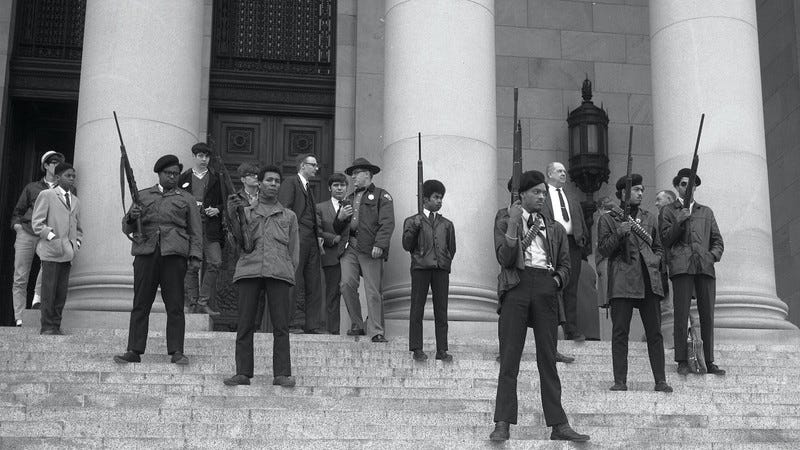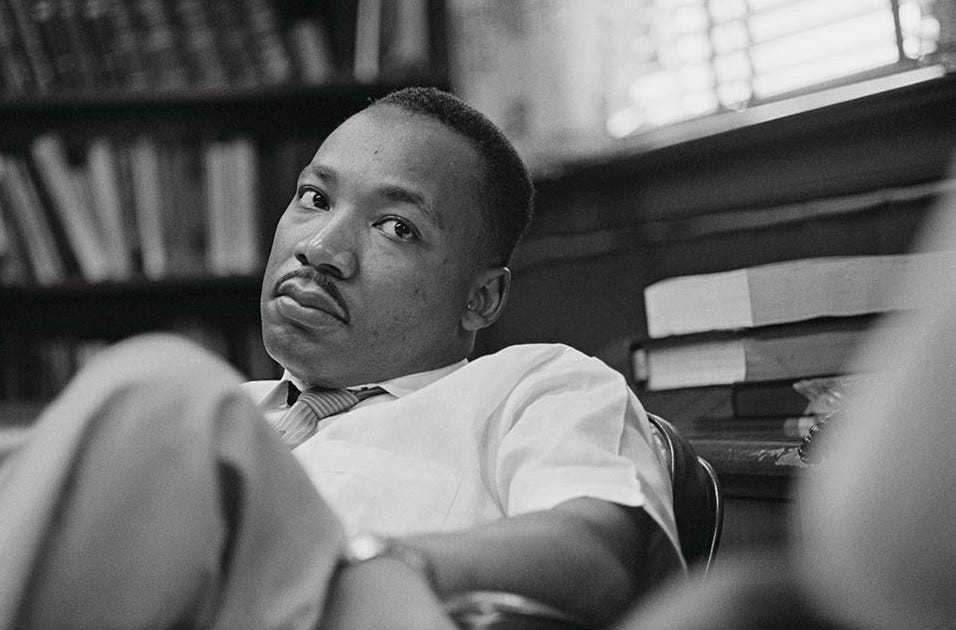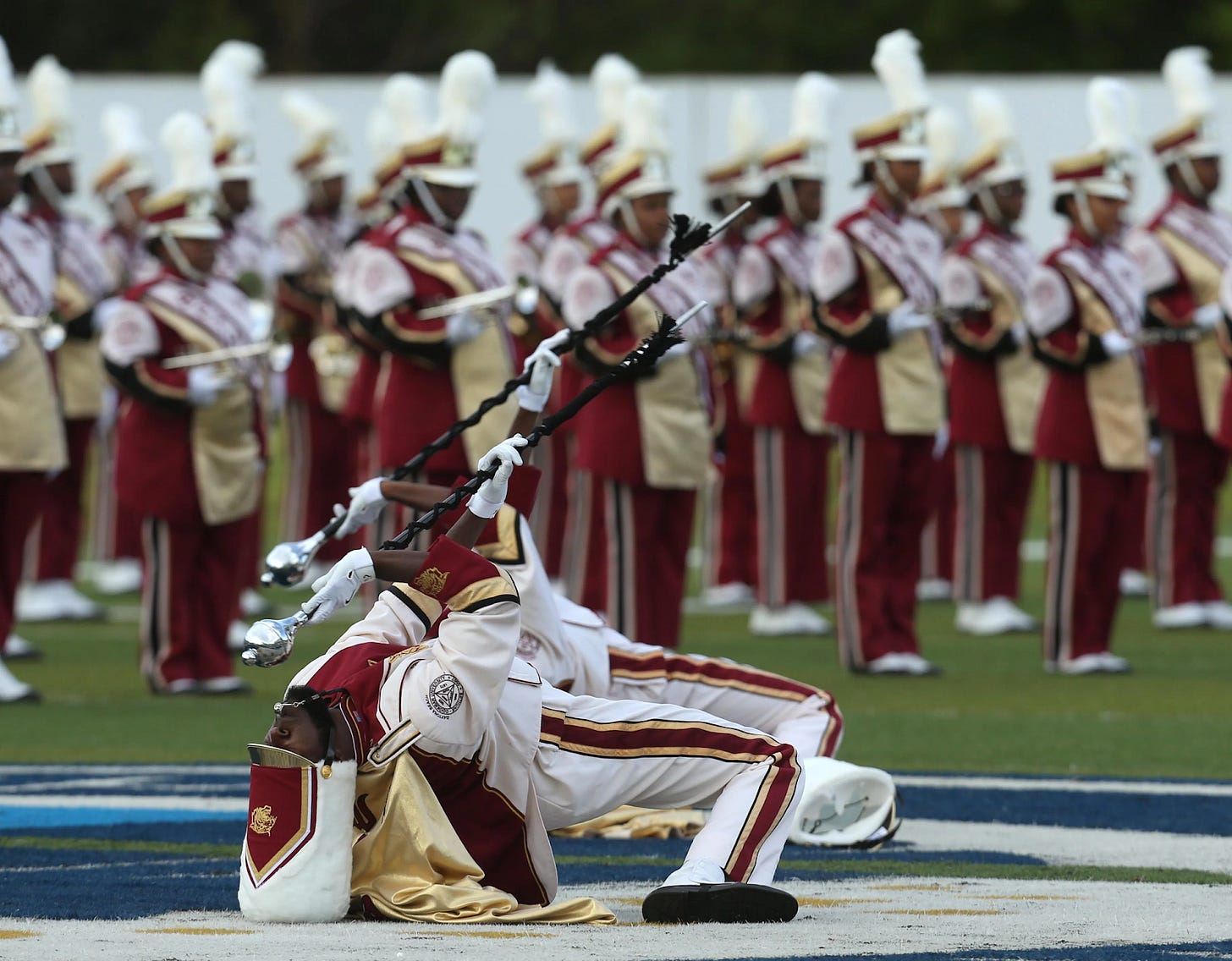Hi Friends,
We started this newsletter in October 2017 because we were already tired of President Pumpkin-Colored PooPooFace, focusing our first newsletter on his decision to rescind DACA. We’ve dedicated the last few years to writing newsletters in response to current events, celebrating joyful happenings, mourning heartbreaking experiences, and of course, digging into mess.
The good news is none of that is changing! However, for our own sustainability and because we simply do not have the energy to respond to everything blustering, chaotic fascists do in the next four years; we are changing the formats for some of our newsletters so we can dive deeper and nerd out over specific topics or events. This week, we want to talk about marching, resistance, and what it takes to get free!
Jumoke & Mitu
l. The Conversation
What’s old is new again.
That orange man and his ilk are on the way, and they’ve gleefully made their plans to eliminate basic human rights very clear. Their plans this time go beyond just the elimination of rights however, and more emphatically also includes the complete erasure of marginalized people, particularly trans people.
Given the reality in front of us, what we do, and how we meet the moment is the foundational conversation for those who believe in freedom.

The viability of marching for example, is being so fiercely debated that this WILD clip of Dr. King’s “I’m tired of marching” quote set to a sample beat is actually a thing. We are in a peculiar place, where some are marching, while others are loudly comparing marching to an exercise in helplessness.
This has always been the case. Marching and other nonviolent political tactics are often (not always) seen as the futile option in contrast to a more militant response. This was the case during the Civil Rights and Abolitionist Movement.
“After he put down that March on Washington – and you see all through that now, he tricked you, had you marching down to Washington. Had you marching back and forth between the feet of a dead man named Lincoln and another dead man named George Washington, singing, ‘We Shall Overcome.” - Malcolm X, The Ballot or the Bullet (1964)
You don’t get freedom peacefully. Freedom is never safeguarded peacefully. Anyone who is depriving you of freedom isn’t deserving of a peaceful approach by the ones they’re depriving of freedom.” - Malcolm X, 1963
120 years before Malcolm X shared his thoughts on what it takes to get free (sentiments he soon abandoned, see Malcolm X: A Life of Reinvention), militant abolitionist Henry Highland Garnet, expressed similar beliefs about what true liberation would require for the enslaved:
“Let your motto be resistance! Resistance! Resistance! No oppressed people have ever secured their liberty without resistance.”
Black people, and really all oppressed people, have been in conversation for centuries about what it means to be free in America and how we get there.
No matter how ahistorical the fascists want it to be, the story of America is the story of resistance (A People’s History of the United States: 1492 – Present).
The mode of resistance is just the plot twist. Will white women descend on the capitol wearing pink hats on the National Mall (2017)? Will white men throw good-ass tea into a Harbor (1773), or just send the teas back very angrily ala the lesser-known Philadelphia Tea Party (that’ll show em!)? Or are Black Panthers being absolutely unambiguous about what it means for them to safeguard Black lives (1967)?

How we resist reflects the time we live in, just as much as it reveals who or what we are resisting.
And the fact that many have soured on marches speaks to this current moment. For the generation who marched for the Jena Six, against the Invasion of the War in Iraq, for justice for Trayvon, and Mike, and Sandra, and George, and Breonna, and Tamir, and for so many unarmed Black people murdered by the state, marching can feel like an inadequate response given where we are in this country.

In this context, our current response to marching can sit at a complicated yet nuanced intersection. We can understand it as the symbolic apex of the Civil Rights Movement, embodying both its collective power and the urgency of demands. The political tactic that forced the hand of racists in Selma, Birmingham, Montgomery, and so many other Southern cities. Marching can both be a reclamation of power and also a tactic that just doesn’t quite meet this moment.
What can my Black ass do?
“The major job was getting people to understand that they had something within their power that they could use. Marches and demonstrations help people realize their strength.” - Ella Baker
March if you want to! People are marching in London and globally in support of a ceasefire and free Palestine, in New York in protest of skyrocketing healthcare costs, and in New York and globally in support of union recognition and better working conditions for Amazon workers. We should note, for the most part, these marches are part of larger strategy including community education, fundraising, strikes, and other direct actions.
If marching isn’t where you are, choose your peace!
Where you will not find me (Jumoke) is at the goddamn National Mall in the middle of January with a white woman from Michigan whose whole family are Trump voters. Y’all can keep it.
We are not powerless. There are so many ways to resist. Give to mutual aid. Become a Big Brother/Sister/Person. Clean up Rock Creek. Buy lunch for your local civil rights lawyer. Join with the 2.2 million federal workers scared about what the coming regime means for America and for their livelihood. Buy dinner for the friend falling into despair. We all we got. And if you have time, dollars, or gently used items to spare, share those with your community.
Read! We gave you a few options in this newsletter, but what’s old is always new again. And people have debated for decades about what to do with high profile activists (and if they’re in it for * ~ the right reasons ~ *), who is seeming very cointelpro-y, what the role is of moneyed and powered people in movement, strategy and tactics, and more. We can read and learn from those who came and fought before us. Here is a NYPL Reading List to start.
Do not cross picket lines! Don’t ever, ever be a scab! Relatedly, Amazon Teamsters in NYC have voted to authorize a strike.
II. Other Things
Black-ass happenings.
RIP to the great Nikki Giovanni.
Blue Ivy is a precious pre-teen.
A joy to experience Viola Davis dragging Annalise Keating.
There is no storyteller like Ms. Jenifer Lewis. Her full interview here.
In line with that, if you haven’t, please watch Ms. Jenifer Lewis in the best music mockumentary ever made, Jackie’s Back.
Our Black-Ass song(s) of the week (Mitu):
One of my favorite Christmas albums is Tamar Braxton’s Winter Loversland, and Sleigh Ride is a standout track.
Things we look forward to / Things we recommend:
I (Jumoke) look forward to lying down at my mama’s house.
I (Mitu) look forward to a break from work spent with the best genre of film and music - holiday.
lll. Message from a Black-Ass Baby
Sometimes your babies are a mirror, and you have to accept what is reflected!
Stay Black, have a snack, and take a nap today.






